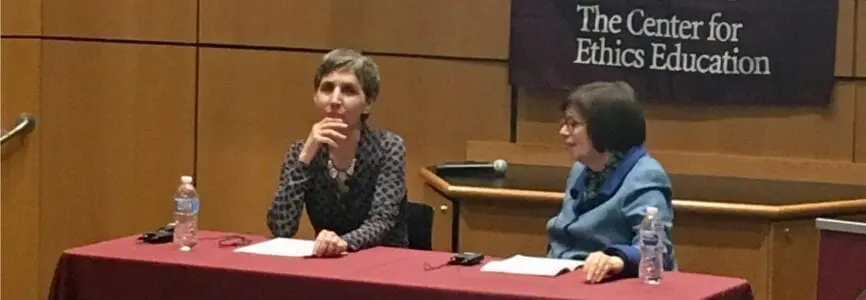Hastings Center News
Hastings Scholar and Pulitzer Prize-Winning Journalist on Conscientious Objection
When is it acceptable for health care professionals to refuse to provide a treatment because it violates their conscience? The implications of recent developments in federal and state governments that increase protections for conscientious objection were the focus of a panel discussion in New York City with Hastings Center research scholar Nancy Berlinger and Pulitzer prize-winning journalist Linda Greenhouse.
“Conscience Matters: Tensions Between Religious Rights and Civil Rights” took place on April 19 at Fordham University’s Lincoln Center campus. The event was hosted by the Fordham University Center for Ethics Education.
Conscientious objection – the refusal to perform or participate in an activity associated with a professional role due to personal beliefs — is a longstanding legal and ethical issue. Greenhouse and Berlinger highlighted ways that this concept, though an important tenet of civil society, has become overprotected.
Greenhouse examined recent Supreme Court cases in which conscientious objection has been invoked, including Burwell, Secretary of Health and Human Services, et al. v. Hobby Lobby Stores, Inc., et al., which was decided in favor of two family-owned, for-profit corporations whose owners had religious objections to the federal requirement that employment-based group health insurance plans provide access to contraceptives. Greenhouse also cited a case currently before the Supreme Court that examines whether a baker can refuse to create a wedding cake for a same-sex couple because of a religious objection to same-sex marriage. “When conscience clauses give certain individuals the ability to opt out of a rule, what is the cost to society?” Greenhouse asked. “Who pays?”
Linda Greenhouse discusses the idea of governments having a “conscience.” pic.twitter.com/aZhNbxKuK4
— Fordham Ethics (@FordhamEthics) April 19, 2018
Nancy Berlinger discussed conscience objection in the context of health care. She cited the creation in January of a new Conscience and Religious Freedom Division in the Department of Health and Human Services, which increases enforcement of laws that permit doctors and other health care workers to refuse to provide services such as abortion or physician aid-in-dying because of moral or religious objections. While providers ought to have the right to abstain from administering certain services based on their convictions, such refusal may infringe on a patient’s right to access proper, legal, medically appropriate, and timely care. Health care workers should therefore preemptively let their colleagues know about their specific objections in order to minimize disruptions in the delivery of treatment to patients, said Berlinger.
Nancy Berlinger: Conscience clauses may contribute to structural stigma against not just patient populations, but provider populations that choose to perform certain services.
— Hastings Center (@hastingscenter) April 19, 2018
“Health care is not an arena for expressions of our moral [ideas].” – Nancy Berlinger, PhD #bioethics #healthcare #medicalethics #ethics pic.twitter.com/JEXvb1rLb7
— Fordham Ethics (@FordhamEthics) April 19, 2018
The central duty of health care is to care for patients, and conscience in health care work always exists in relation to that duty, Berlinger said. Blocking health care access or discriminating against patients is unethical, and invoking “conscience” does not make it right.
For more coverage, visit Fordham News.

